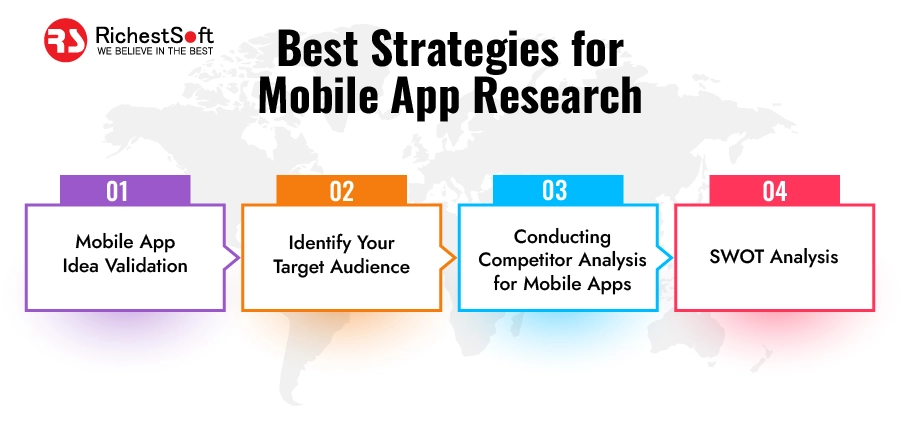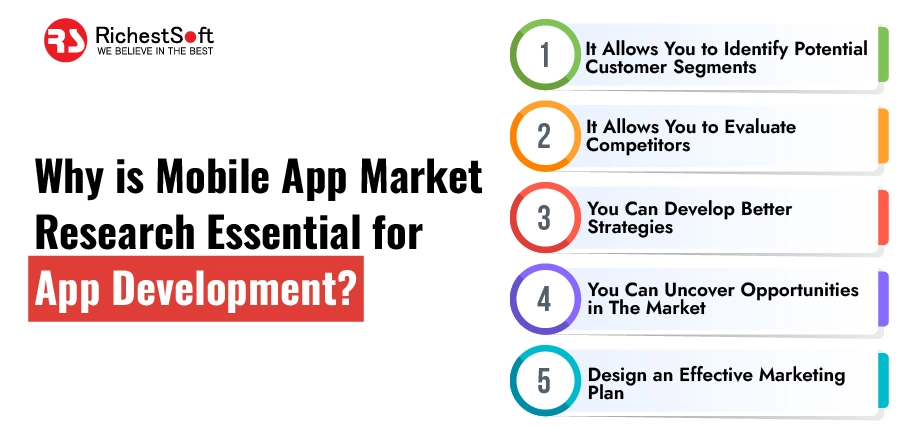The mobile app business is getting more and more competitive as technology advances. Companies must have a solid awareness of the current market trends and consumer preferences to survive and grow in such a scenario. In this article, we provide a step-by-step guide to conducting mobile app market research for your business so you can stay ahead of the competition.
INTRODUCTION
Mobile application development is an exciting endeavor. Young entrepreneurs and established firms alike are keen to develop their app concepts.
But before you jump into development, you must complete a few tasks.
Mobile app market research is undoubtedly the most crucial phase of any undertaking, and it validates your ideas and establishes the groundwork for all subsequent stages of mobile app development. No matter what type of app you’re developing, you must conduct mobile app research.
By reading on, learn more about mobile app research, the significance of market research, and the most effective market research tactics for mobile app development.
What is Mobile App Market Research?
While researching mobile apps, understand your target market, competitors, industry, and current trends. Every effort to create a mobile application starts with market research.
Mobile app market research assists in validating your app concept and ensures your app is meeting demand in the industry.
Data collection and analysis are required for mobile app research. Sometimes, you can obtain data from existing sources, and occasionally, you must conduct independent research. Most of the time, these two methodologies are combined in market research.
The following questions are addressed by research on mobile applications:
Is there a demand for your application on the market?
What are the preferences of your target market?
Who are your rivals, and what challenges do you face?
Is there a unique way in which your mobile app differs from those of the rivals?
Do you have a workable business plan for mobile apps?
How do you develop a marketing plan that is optimized?
Go with reliable and reputable sources like Statista, Pew Research Center, Gallup, Google Trends, and comparable resources while gathering information from existing sources.
For general statistics on smartphone users, market trends, and other facts about mobile technology, you can also consult our Mobile App Statistics Handbook.
The original research primarily uses focus groups, interviews, customer surveys, and observation.
Also Read: Mobile App Marketing – An Ultimate Guide
Why is Mobile App Market Research Essential for App Development?
The highest quality market research is the foundation of any successful mobile application.
Without completing in-depth research, you are just speculating whether people will want your mobile application. If you go through the entire mobile app development process to find that there isn’t a market need for your product, this could be a very costly estimate.
Testing the concept before creating code or engaging a development team can save you time and money.
Through market research, you can also identify competitors and success barriers.
Imagine, for instance, that you have an idea for an app allowing people to share and watch films from their smartphones easily. Users can make their accounts, comment on videos, like material, and follow content producers.
Excellent concept, no? This concept merely characterized YouTube.
You may determine this through market research and likely avoid directly competing with the world’s largest video hosting platform.
Instead, you can change the focus of your original app concept thanks to the market research you did. You may still intend to develop a video hosting service but want it to be tailored exclusively for online learning.
You may better understand your customers with the use of market research. You’ll learn more about them and what they want and need. Your mobile app’s intended audience is interested in using it. Yet, market research might support or refute your notion.
Based on your findings, you can create the groundwork for your mobile app features, brand positioning, and marketing methods.
Types of Mobile App Research

It becomes much easier to perform market research after you categorize everything.
Primary and secondary research are the categories into which market research for mobile app development can be divided. Next, we’ll look more closely at each of these phases.
Primary Research
Before anything else, you must analyze the market for your users.
Choose your target market and educate yourself as much as you can about them. Consider general information, habits, preferences, dislikes, needs, and wants. Then focus your research even more on how they interact with mobile applications.
Your main study should also consider the most recent technical developments and how the market affects your business plan.
These first steps are crucial since early market research ultimately serves as your guide throughout the whole mobile app development process.
You may choose whether to target specific users. You could also frame some of the features of your mobile app based on this exploratory market research.
Think about the case where you want to create a real estate app. The initial idea was intended for homebuyers.
Yet once you’ve done your primary research, there isn’t much of a market for this product. The app’s purpose may not have met the target audience’s needs, or the market may be oversaturated.
Even if you have experience in the Real Estate Sector, you can still create the app. Instead, you’ll change your focus to an app that caters to the demands of real estate brokers.
The features of the app will then be determined by how well they serve the needs of your new target market.
Secondary Research
The second phase involves researching your sales and marketing plan.
You’ve already decided that your plan is sound and that moving forward will be beneficial. Expand on your current research to learn how to reach your target audience.
You’ll use this information to create a marketing plan, enhance your social media presence, create ad copy, and carry out other tasks to entice and capture your target market.
What elicits a response from your target audience? How can you market your mobile app so that it makes people feel something?
Your secondary research will influence your branding and market positioning within your specialization.
Consider the scenario where you are developing a B2B mobile application for other companies. Your secondary research might assist in establishing your market positioning as an application for productivity enhancement rather than just identifying yourself as a project management tool.
This approach aligns more with the issues your target audience is attempting to resolve.
Also Read: Top 15 Mobile App Development Trends That Will Rule the Market in 2023
Best Strategies for Mobile App Research

Market research varies from person to person. Yet, there are some tried-and-true methods particular to mobile app development that might point you in the correct direction:
1. Mobile App Idea Validation
You must test your idea for a mobile application
If there is no interest in your app, there is little point in carrying out the other market research techniques. You should return to the drawing board and change your original idea.
It’s not necessarily terrible to learn that there is no market demand for your software, and when they discover this information, many people are disappointed. But it would be best if you were glad you refrained from investing money in a venture that wouldn’t pay off.
Instead, you could develop new ideas based on your learning during the validation stages.
You need to get out and start conversing with people to validate a mobile app idea.
Run focus groups with customers. Organize interviews. Send out polls.
Make every effort to learn as much as you can about the demands of potential users and how your proposal satisfies or fails to satisfy those needs.
2. Identify Your Target Audience
Identifying the target market for your app is another crucial aspect of your market research.
Too often, we hear things like “my app is great for women of all ages” or “my app is for everyone.” That isn’t detailed enough.
You should specify more specific qualities, such as:
Location, Age, Gender, Marital status
Occupation, Background Income, Highest level of education
Personality traits, Values, Hobbies, Lifestyle choices and Behavior
When developing mobile apps, you must also determine which of your target audience prefers mobile devices.
If you learn that 90% of your target market uses iPhones, you may immediately decide against making an Android app for the Google Play Store. Make an iOS app to concentrate all your efforts on Apple products.
Remember that other users or people interested in your app are not being left out while conducting market research on your target demographic. Yet your target market will be your primary area of attention and effort.
3. Conducting Competitor Analysis for Mobile Apps
A need for creating mobile applications is researching competitors.
Today, 100 percent of original smartphone apps are hard to find, and at least a few other apps on the market likely perform features like yours.
It’s your responsibility to locate those rivals. Find out what they are doing well and what areas their apps need improvement.
You can use this knowledge to develop an app that addresses the weaknesses of your rivals.
Even if you believe such players have an advantage because their apps are already accessible for download, you can advance more quickly by staying away from their blunders.
It would be best to decide how to differentiate yourself from the competitors.
What makes you different from others? Why would someone choose to download your software over one that does the same function?
It may be due to your marketing strategy, feature variations, target audiences, or combination.
4. SWOT Analysis
A SWOT analysis may already be well-known to many of you. It is an abbreviation that means:
- Strengths
- Weaknesses
- Opportunities
- Threats
Market research is unquestionably one of the many excellent uses for conducting a SWOT analysis in many business settings.
Discuss your research results from primary and secondary sources with your team. Now, list every idea you have for each of these categories.
- What is your advantage?
- Where are you vulnerable?
- Exist any particular user groups, niches, or features that a new market could utilize?
- What rivals or other market variables may damage your application?
A SWOT analysis ultimately aids in your preparation for mobile app development and marketing initiatives. It also helps you stay one step ahead of the competition by increasing your awareness of the market and yourself.
FAQs
1. What is mobile app market research?
Mobile App Market Research is the process of collecting and analyzing data related to the mobile app industry. It is a vital tool for businesses who want to understand customer behavior and make informed decisions. It can provide insights into consumer preferences, competition, trends, pricing models, customer demographics, and more. With powerful market research tools like surveys and focus groups, you can gain an in-depth understanding of your target market and uncover invaluable information that will help you stand out in today’s competitive app marketplace.
2. Why is Mobile App Market Research essential for App Development?
Mobile App Market Research is essential for App Development because the insights it provides are invaluable. With this research, you can identify trends, find out what customers want, assess competition and user behavior, and understand how to design a successful app. Furthermore, market research allows you to understand which app platforms to use and reduces potential risks associated with building an app. With mobile app market research, you have access to vast amounts of data that can help inform your decisions.
3. What are the Strategies for Mobile App Research?
To ensure success in mobile app research, there are some strategies that must be taken into consideration. Firstly, it’s essential to know the target audience and what they expect from the product. Secondly, market analysis is key to identify competitors, user behaviour and preferences. Thirdly, customer feedback should be monitored regularly in order to make improvements and updates. Finally, use analytics tools to measure user engagement and satisfaction with the product over time. By following these strategies you will have a greater chance of success in mobile app market research.
4. What are Types of Mobile App Research?
At Mobile App Market research, we offer a variety of research services to help business people make informed decisions. We provide custom market analysis, user feedback, competitive analysis, industry trends and more. By utilizing our market research tools and methods, you can make the right decisions for your business and be successful in the mobile app space.
Also Read: Why is Mobile App Design Important to Drive Successful App?
Conclusion
Mobile app market research is essential to any successful mobile app development project. Through comprehensive analysis, you can obtain valuable data to help guide your decisions and ensure that your app meets consumer needs and preferences. Following the steps outlined in this article, you can successfully conduct effective market research for your mobile application project. With the right insights and information, you will be better equipped to develop a successful product or service that meets customer expectations while staying ahead of the competition.








Leave a Reply